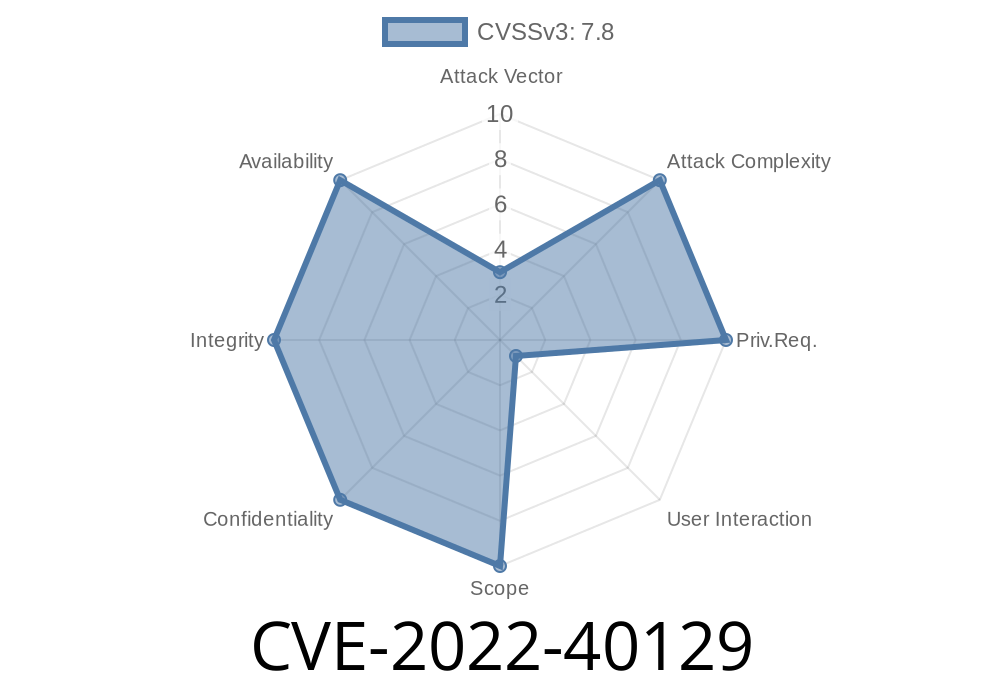In late 2022, security researchers discovered a serious vulnerability in Foxit PDF Reader — a popular alternative to Adobe Acrobat — specifically in version 12..1.12430. This flaw, tracked as CVE-2022-40129, is a classic use-after-free bug in the software’s JavaScript engine. Reading about vulnerabilities can be intimidating, but we’ll break it down in simple terms.
This post explains what CVE-2022-40129 is, how it can be exploited, and what you can do to protect yourself.
What is a Use-After-Free Bug?
A use-after-free bug happens when a program frees a piece of memory (let's say a box that held some data), but later tries to access or "use" that box again. That memory could now hold something else, or worse, an attacker might be able to put their own code in that freed box. Foxit Reader's JavaScript engine made this mistake when handling certain functions.
Vulnerability Type: Use-after-free
- Impact: Arbitrary code execution — that means an attacker can make your computer run code of their choice!
Original Advisory
You can read the official advisory here:
Foxit Security Bulletin
NIST database entry:
https://nvd.nist.gov/vuln/detail/CVE-2022-40129
How Does the Exploit Work?
The vulnerability sits in the JavaScript engine Foxit uses for handling interactive PDF features. PDFs can contain JavaScript to make documents interactive (like turning pages, handling forms, etc.).
In this case, a PDF might use the Optional Content Group (OCG) API to organize layers or elements in a PDF. If the JavaScript inside the PDF calls certain OCG functions in the wrong order, it can trick Foxit into freeing memory, then using that freed memory again — allowing the attacker to sneak in their own instructions.
Proof-of-Concept Snippet
Below is a simplified snippet mimicking how JavaScript in the malicious PDF could exploit the vulnerability.
// Hypothetical sample for educational purposes only!
var ocg = this.getOCGs()[]; // Get OCG layer
// Simulate freeing underlying objects
delete ocg.name;
// Trigger use-after-free by accessing the freed object
var oldName = ocg.name; // Memory corruption occurs here
// Attacker sprays heap to take control over the freed memory
var arr = [];
for (var i = ; i < 10000; i++) {
arr.push(new Array(100).fill("EXPLOIT"));
}
// Now, the program might jump and run attacker's code
*This example is conceptual; actual exploitation code is much more complicated and can only be crafted by skilled attackers.*
Researchers have published technical details and real proof-of-concept exploits
- ZDI-22-1147: Foxit PDF Reader JavaScript Engine OCG Use-After-Free Remote Code Execution Vulnerability
- Exploit-DB Entry
Real-World Scenario: What Could Happen?
Let’s say you receive an email titled "Invoice PDF Attached" and you open the file in Foxit Reader. If the file is malicious, the hidden JavaScript code triggers the bug. Done right, malware is installed, your webcam is accessed, or files are stolen — all without warning.
Worse, if your browser has Foxit's browser plugin enabled, just visiting a compromised website could trigger the attack!
Update Foxit Reader: The vendor released a patched version; update now!
- Disable JavaScript in PDFs: Under Foxit’s security settings, you can stop PDFs from running JavaScript.
References
- Foxit Security Bulletins
- CVE-2022-40129 - NVD
- Zero Day Initiative Advisory ZDI-22-1147
- Exploit-DB 51137
- How to disable JavaScript in Foxit Reader
Final Thoughts
CVE-2022-40129 shows how risky it can be to trust files from strangers — even if they look like ordinary invoices or forms. Vendors move quickly to patch these bugs, but users must update and stay vigilant. If you use third-party PDF readers with advanced features like JavaScript support, check your settings and be prepared to turn off risky functions.
Timeline
Published on: 11/21/2022 16:15:00 UTC
Last modified on: 11/22/2022 01:07:00 UTC
